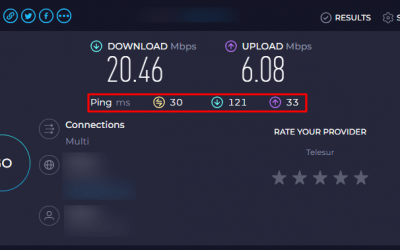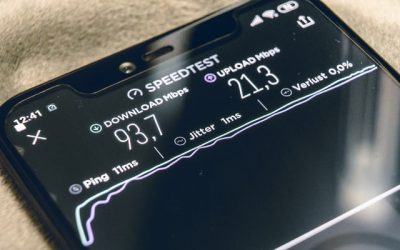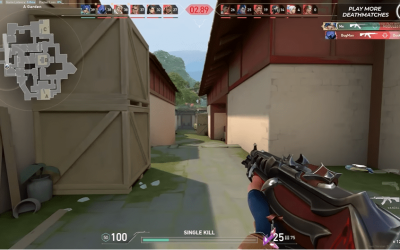Test your current internet speed
Before you get started, test your current internet speed. Use your speed test result as a baseline and compare the results as you go through your journey on reaching a faster internet connection.
SpeedtestThe internet has become an essential part of our lives, enabling us to connect, learn, and access information from anywhere in the world.
However, the speed at which we can access the internet varies across different countries.
In this article, we will explore the internet speed in Indonesia, its significance, challenges, and opportunities for improvement.
Understanding Internet Speed
Before delving into Indonesia’s internet speed, it’s important to understand how it is measured.
Internet speed is determined by various factors, including the quality of infrastructure, technology used, and the efficiency of internet service providers (ISPs).
These factors collectively influence the overall speed experienced by internet users.
Internet Speed in Indonesia: An Overview
Historical Context
Indonesia’s journey in establishing a robust internet infrastructure began in the late 1990s.
Initially, internet connectivity was limited and expensive, primarily accessible to government institutions and educational organizations.
However, with technological advancements and increased demand, internet access gradually expanded across the country.
Internet Infrastructure
Today, Indonesia boasts a diverse internet infrastructure, including undersea cables, fiber optic networks, and wireless connectivity.
The country is also investing in the development of 5G technology to enhance internet speed and reliability.
However, despite these advancements, challenges still exist in providing high-speed internet access to all regions.
Internet Service Providers
Several ISPs operate in Indonesia, offering internet services to residential and commercial users.
Some prominent ISPs include Telkom Indonesia, Indosat Ooredoo, XL Axiata, and Smartfren.
These providers play a crucial role in delivering internet connectivity to millions of users throughout the country.
Measuring Internet Speed
To determine the speed of an internet connection, various speed test tools are available.
These tools assess the download and upload speeds of an internet connection and provide valuable insights into its performance.
Factors such as network congestion, distance from servers, and the device used can affect the results of these tests.
Factors Affecting Internet Speed
Several factors can impact internet speed.
These include the quality of the infrastructure, the type of connection (mobile or fixed broadband), network congestion, and the distance between the user and the internet server.
Understanding these factors helps identify areas for improvement in internet speed.
Average Internet Speed in Indonesia
Indonesia’s internet speed can vary depending on the type of connection.
Let’s explore the average speed for both mobile internet and fixed broadband connections.
According to Speedtest Global Index, as of March 2023, Indonesia’s mobile internet speed is 17.24 Mbps, and its fixed broadband speed is 16.65 Mbps. This means that Indonesia’s internet speed is slower than the global average of 37.92 Mbps for mobile internet and 50.22 Mbps for fixed broadband.
Here are the top 5 mobile internet providers in Indonesia with their median download speeds in Q1 2023:
- Telkomsel: 24.48 Mbps
- Indosat Ooredoo: 22.22 Mbps
- XL Axiata: 20.79 Mbps
- Tri (3): 17.53 Mbps
- Smartfren: 16.16 Mbps
Here are the top 5 fixed broadband providers in Indonesia with their median download speeds in Q1 2023:
- IndiHome: 25.12 Mbps
- Telkomsel Orbit: 24.48 Mbps
- XL Home: 22.22 Mbps
- Biznet Home: 20.79 Mbps
- MyRepublic: 17.53 Mbps
It is important to note that internet speed can vary depending on the location, time of day, and other factors.
Comparing Indonesian Internet Speed with Other Countries
When comparing Indonesia’s internet speed with other countries, it is essential to consider the country’s size and population.
Indonesia’s archipelago geography poses unique challenges in establishing a consistent and high-speed internet connection throughout the country.
While internet speeds in some regions may be comparable to global averages, others may lag behind due to infrastructure limitations.
Challenges and Opportunities for Improving Internet Speed in Indonesia
Enhancing internet speed in Indonesia requires addressing several challenges while leveraging opportunities for improvement.
Infrastructure Development
Expanding and upgrading the internet infrastructure is crucial for improving internet speed.
This includes increasing the coverage of fiber optic networks, enhancing existing undersea cables, and establishing better connectivity in remote areas.
Collaborative efforts between the government and private sector are vital for infrastructure development.
Government Initiatives
The Indonesian government has recognized the importance of high-speed internet and has initiated various programs to enhance internet connectivity across the country.
These initiatives include improving regulatory frameworks, incentivizing investment in infrastructure, and bridging the digital divide in underserved regions.
Private Sector Involvement
Private sector involvement is essential in driving innovation and investment in internet infrastructure.
ISPs and technology companies play a crucial role in improving internet speed by investing in advanced technologies, expanding network coverage, and offering affordable and reliable services.
Impact of Internet Speed on Individuals and Businesses
Faster internet speed brings numerous benefits to both individuals and businesses in Indonesia.
Consumer Experience
With faster internet speed, users can stream high-definition videos, enjoy seamless online gaming, and download large files quickly.
It enhances the overall online experience, making tasks more efficient and enjoyable.
E-commerce and Online Services
Fast internet speed is crucial for the growth of e-commerce and online services in Indonesia.
It enables businesses to provide a seamless shopping experience, facilitates secure online transactions, and boosts the digital economy.
Education and Remote Work
As remote work and online education become more prevalent, reliable and high-speed internet connections are essential.
Faster internet speeds enable students to attend virtual classes, professionals to collaborate seamlessly, and businesses to operate remotely more effectively.
Future Outlook and Trends
The future of internet speed in Indonesia looks promising, with several trends and technologies shaping the landscape.
5G Technology
The implementation of 5G technology will revolutionize internet connectivity in Indonesia.
With faster speeds, lower latency, and increased capacity, 5G will unlock new possibilities in areas such as autonomous vehicles, Internet of Things (IoT), and augmented reality (AR) applications.
Fiber Optic Expansion
Expanding the coverage of fiber optic networks will significantly improve internet speed in Indonesia.
Fiber optics provide faster and more reliable connections, enabling users to access data-intensive applications with ease.
Satellite Internet
Satellite internet is another technology that holds promise for remote areas with limited infrastructure.
By leveraging satellite communication, internet connectivity can be extended to regions where laying fiber optic cables is challenging.
Conclusion
Internet speed in Indonesia has come a long way, but there is still room for improvement.
While average speeds vary across regions and types of connections, efforts are underway to enhance internet infrastructure and increase accessibility.
Faster internet speeds will have a positive impact on individuals, businesses, and the overall digital economy of Indonesia.
FAQs
FAQ 1: Why is internet speed important?
Internet speed is important because it determines how quickly data can be transmitted and received over the internet. Faster internet speed provides a smoother online experience, allowing users to stream videos, download files, and browse websites more efficiently.
FAQ 2: How can I improve my internet speed in Indonesia?
To improve internet speed in Indonesia, you can try the following steps:
- Contact your internet service provider to inquire about faster plans.
- Position your Wi-Fi router in a central location for better coverage.
- Minimize interference from other electronic devices.
- Close unnecessary background applications that may consume bandwidth.
FAQ 3: What are the advantages of faster internet speed?
Faster internet speed offers several advantages, including quicker downloads, seamless video streaming, smoother online gaming, and improved productivity for businesses. It enables faster access to information, enhances communication, and supports the growth of digital services.
FAQ 4: Are there any limitations to improving internet speed in Indonesia?
Improving internet speed in Indonesia faces challenges such as geographical barriers, the vast archipelago, and the need for significant infrastructure investments. However, ongoing initiatives and collaborations between the government and private sector aim to overcome these limitations.
FAQ 5: How can businesses benefit from faster internet speed?
Faster internet speed benefits businesses in Indonesia by enabling efficient online operations, smoother video conferencing, and faster data transfers. It supports e-commerce growth, enhances customer experiences, and improves remote collaboration, ultimately driving business productivity and competitiveness.

The visionary founder behind SpeedtestGo, an innovative platform dedicated to helping users measure and optimize their internet speed. With a deep-rooted love for technology and a mission to empower individuals with reliable internet connections, Shawn has created a remarkable space where users can test their internet speed and gain valuable insights and information through engaging blog content.








